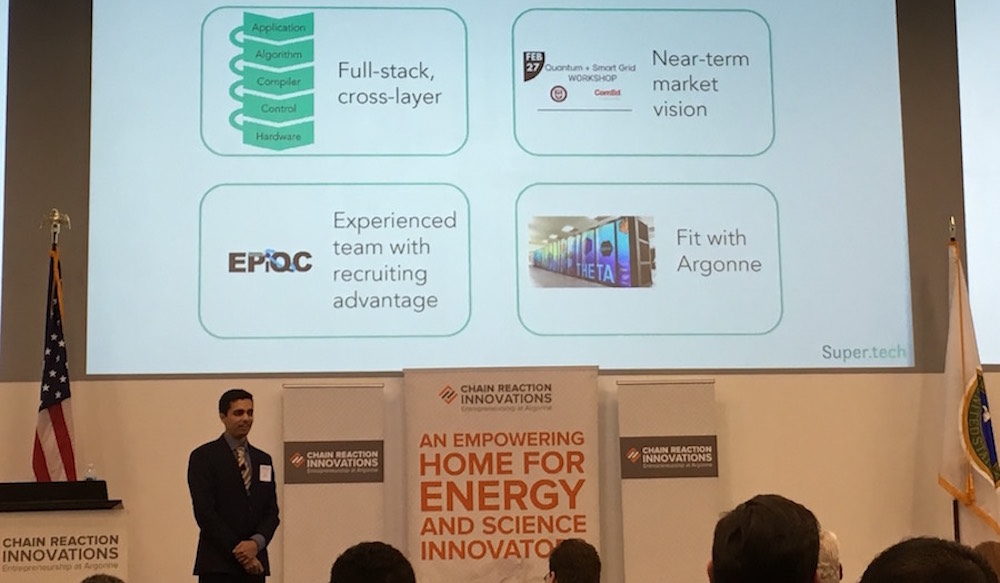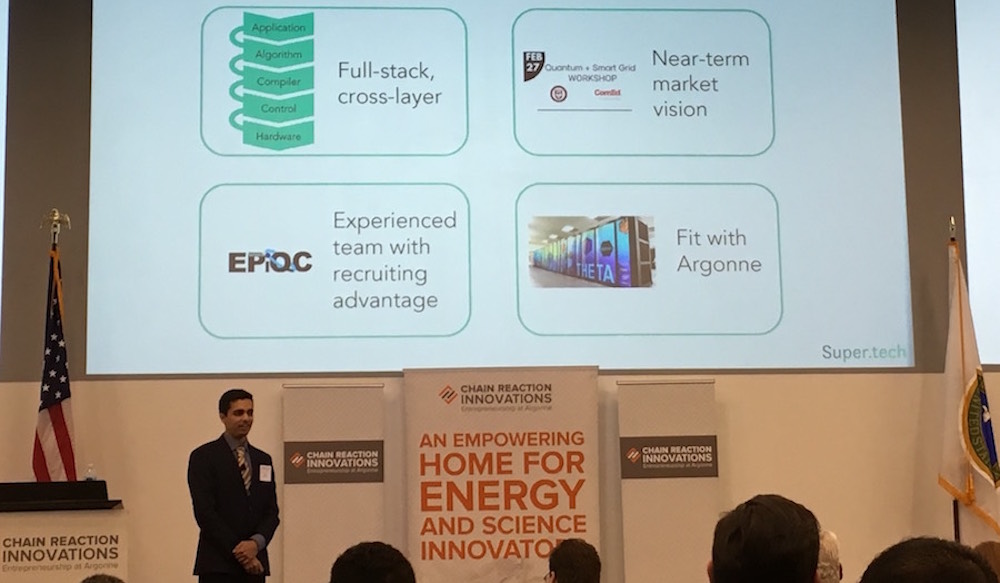
UChicago CS PhD student Pranav Gokhale pitches Super.tech at the finals of the Argonne Chain Reaction Innovations program.
Super.tech, a company founded by UChicago CS PhD student Pranav Gokhale and advised by Professor Fred Chong, has joined this ecosystem with the mission of building a full-stack, cross layer architecture for quantum computing. In recent weeks, the startup has received two important boosts for that vision, joining the Argonne Chain Reaction Innovations incubator program and making the finals of the George Shultz Innovation Fund, a program run by the Polsky Center for Entrepreneurship and Innovation at the University of Chicago.
The two programs promise to jump-start the young startup, which spun off from research at the Enabling Practical-scale Quantum Computing (EPiQC) collaboration, a multi-institutional National Science Foundation Expedition led by Chong at UChicago CS. In parallel with the EPiQC vision of bridging the gap between existing quantum algorithms and tomorrow’s quantum architectures, Super.tech seeks to help quantum software developers of the present and future get the most out of these still-experimental technologies.
Gokhale says that Super.tech will help people building new quantum applications by opening up the inner workings of modern quantum computers — and their elemental component, the qubit — to the developer.
The current state of quantum computers can be compared to the early days of conventional computing, when computers were room-sized, highly-specialized machines that required expert knowledge to execute even the simplest functions. Getting the most out of today’s quantum computers, which currently max out around 60 qubits, requires a combination of computer science and physics knowledge that few developers possess.
“If a programmer is making an iPhone app, they don’t need to know about the physics of transistors. But the current regime of quantum computing is extremely hardware-limited,” Gokhale said. “The numbers are very small; you have tens of qubits and dozens of gates that you can run, and still only a few microseconds of useful computation time,”
“So we should really be thinking about how to maximize utilization of every single qubit and every single gate that we can run on a machine. We are trying to make it so that programmers can easily interact with the device physics of qubits. By cutting out these abstraction barriers, you can get really big efficiency gains. That's what Super.tech is really about.”
That ambition appealed to the judges of the Argonne Chain Reactions Innovation incubator, which chose Super.tech from more than 150 applicants and 15 finalists. The program will provide the startup with funding, office space, and access to Department of Energy resources such as supercomputers and quantum computing testbeds. It also gives the company a cooperative research and development agreement (CRADA), which paves the path to collaborations with Argonne and DOE scientists exploring the frontiers of quantum information science.
Meanwhile, Gokhale and his collaborators prepare for the Spring 2020 finals of the George Shultz Innovation Fund, where Super.tech is one of three remaining competitors. If chosen, the multi-million dollar venture-philanthropy fund supported by alumni donations will help bolster the business side of Super.tech and provide them with the backing of Polsky Center's entrepreneurial leadership and community within Hyde Park.
Additionally, Super.tech is also a finalist for a Small Business Technology Transfer (STTR) grant funded by the Air Force. Gokhale will present to an Air Force panel in June through a Pitch Day process for accelerated STTR funding.
Gokhale, who will finish his PhD thesis this year, believes that UChicago CS and the broader campus environment have provided a fertile environment for merging his scientific and business interests into Super.tech.
“Sometimes there's actual tension between research that gets rewarded in terms of publications and research that gets rewarded in terms of practical applications, and that happens in all fields,” Gokhale said. “But I have been able to carve out a middle path, where the computer architecture community in particular seems to reward very practical outcomes. There's been a lot of support for entrepreneurship and research together through Polsky and CS department initiatives, and through EPiQC. It all worked out.”
The two programs promise to jump-start the young startup, which spun off from research at the Enabling Practical-scale Quantum Computing (EPiQC) collaboration, a multi-institutional National Science Foundation Expedition led by Chong at UChicago CS. In parallel with the EPiQC vision of bridging the gap between existing quantum algorithms and tomorrow’s quantum architectures, Super.tech seeks to help quantum software developers of the present and future get the most out of these still-experimental technologies.
Gokhale says that Super.tech will help people building new quantum applications by opening up the inner workings of modern quantum computers — and their elemental component, the qubit — to the developer.
The current state of quantum computers can be compared to the early days of conventional computing, when computers were room-sized, highly-specialized machines that required expert knowledge to execute even the simplest functions. Getting the most out of today’s quantum computers, which currently max out around 60 qubits, requires a combination of computer science and physics knowledge that few developers possess.
“If a programmer is making an iPhone app, they don’t need to know about the physics of transistors. But the current regime of quantum computing is extremely hardware-limited,” Gokhale said. “The numbers are very small; you have tens of qubits and dozens of gates that you can run, and still only a few microseconds of useful computation time,”
“So we should really be thinking about how to maximize utilization of every single qubit and every single gate that we can run on a machine. We are trying to make it so that programmers can easily interact with the device physics of qubits. By cutting out these abstraction barriers, you can get really big efficiency gains. That's what Super.tech is really about.”
That ambition appealed to the judges of the Argonne Chain Reactions Innovation incubator, which chose Super.tech from more than 150 applicants and 15 finalists. The program will provide the startup with funding, office space, and access to Department of Energy resources such as supercomputers and quantum computing testbeds. It also gives the company a cooperative research and development agreement (CRADA), which paves the path to collaborations with Argonne and DOE scientists exploring the frontiers of quantum information science.
Meanwhile, Gokhale and his collaborators prepare for the Spring 2020 finals of the George Shultz Innovation Fund, where Super.tech is one of three remaining competitors. If chosen, the multi-million dollar venture-philanthropy fund supported by alumni donations will help bolster the business side of Super.tech and provide them with the backing of Polsky Center's entrepreneurial leadership and community within Hyde Park.
Additionally, Super.tech is also a finalist for a Small Business Technology Transfer (STTR) grant funded by the Air Force. Gokhale will present to an Air Force panel in June through a Pitch Day process for accelerated STTR funding.
Gokhale, who will finish his PhD thesis this year, believes that UChicago CS and the broader campus environment have provided a fertile environment for merging his scientific and business interests into Super.tech.
“Sometimes there's actual tension between research that gets rewarded in terms of publications and research that gets rewarded in terms of practical applications, and that happens in all fields,” Gokhale said. “But I have been able to carve out a middle path, where the computer architecture community in particular seems to reward very practical outcomes. There's been a lot of support for entrepreneurship and research together through Polsky and CS department initiatives, and through EPiQC. It all worked out.”




 IonQ Achieves Industry Leading Performance on Next Generation Barium Qubits
IonQ Achieves Industry Leading Performance on Next Generation Barium Qubits